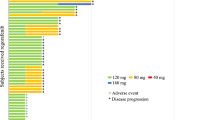Summary
One hundred and seventy six patients (81 controls, 95 receiving treatment) have entered a prospective randomized tiral of long-term oral adjuvant razoxane (ICRF-159) following removal of a colorectal cancer. The median follow-up is 34 months. The treated patients in Dukes' groups B and C have a significantly longer disease-free interval than the control patients (P=0.01 ‘as randomized’ and P=0.004 ‘as treated’). The differences in survival for Dukes' groups B and C are not significant, although follow-up is short. In Dukes' groups B and C, however, 24 of 56 of the patients in the control group have died (43%), as against only 17 of 64 in the treatment group (27%). The treatment produces very few side-effects, is well tolerated by patients, and is taken orally.
Similar content being viewed by others
References
Bakowski MT (1976) ICRF 159, (±)1,2-di(3,5-dioxo piperazin-l-yl)propane NSC-129,943; Razoxane. Cancer Treat Rev 3:95–197
Bellet RE, Engstrom PF, Catalano RB, Creech RH, Mastrangelo MJ (1976) Phase II study of ICRF-159 in patients with metastatic colorectal carcinoma previously exposed to systemic chemotherapy. Cancer Treat Rep 60:1395–1397
Berge T, Ekelund G, Mellner C, Pihl B, Wenckert A (1973) Carcinoma of the colon and rectum in a defined population. Acta Chir Scand [Suppl] 438
Davis HL, Kisner DL (1978) Analysis of adjuvant therapy in large bowel cancer. Cancer Clin Trials 1:273–287
Dukes CE (1944) The surgical pathology of rectal cancer. Proc R Soc Med 37:131–144
Dukes CE, Bussey HJR (1958) The spread of rectal cancer and its effect on prognosis. Br J Cancer 12:309–320
Fielding LP, Stewart-Brown S, Dudley HAF (1978) Surgeon-related variables and the clinical trial. Lancet 2:778–779
Gill PG, Morris PJ (1978) The survival of patients with colorectal cancer treated in a regional hospital. Br J Surg 65:17–20
Grage TB, Hill GJ, Cornell GN, Frelick RW, Moss SE (1979) Adjuvant chemotherapy in large bowel cancer — Updated analysis of single-agent chemotherapy. In: Jones SE, Salmon SE (eds) Adjuvant therapy of cancer, vol II. Grune & Stratton, New York, pp 587–594
Hallowes RC, West DG, Hellmann K (1974) Cumulative cytostatic effect of ICRF-159. Nature 247:487–490
Hellmann K, Burrage K (1969) Control of malignant metastases by ICRF 159. Nature 224:273–275
Higgins GA Jr, Lee LE, Dwight RW, Keehn RJ (1978) The case for adjuvant 5-fluorouracil in colorectal cancer. Cancer Clin Trials 1:35–41
Le Serve AW, Hellmann K (1972) Metastases and the normalization of tumour blood vessels by ICRF 159: A new type of drug action. Br Med J I:597–601
Marciniak TA, Moertel CG, Schutt AJ, Hahn RG, Reitemeier RJ (1975) Phase II study of ICRF-159 (NSC-129943) in advanced colorectal carcinoma. Cancer Chemother Rep 59:761–763
McDermott FT, Hughes ESR, Pihl EA, Milne BJ (1980) Changing survival prospects in carcinoma of the rectum. Br J Surg 67:775–780
Moertel CG (1978) Chemotherapy of gastrointestinal cancer. N Engl J Med 299:1049–1052
Paul AR, Catalano RB, Engstrom PF (1980) Phase III study of ICRF-159 versus 5FU in the treatment of advanced metastatic colorectal carcinoma. Cancer Treat Rep 64:1047–1049
Peto R, Pike MC, Armitage P, et al (1977) Design and analysis of randomised clinical trials requiring prolonged observation of each patient. II. Analysis and examples. Br J Cancer 35:1–39
Salsbury AJ, Burrage K, Hellmann K (1970) Inhibition of metastatic spread by ICRF 159: Selective deletion of a malignant characteristic. Br Med J IV:344–346
Salsbury AF, Burrage K, Hellmann K (1974) Histological analysis of the antimetastatic effect of (±)-1,2-Bis(3,5-dioxopiperazin-1-yl)propane. Cancer Res 34:843–849
Spratt JS, Spjut HJ (1967) Prevalence and prognosis of individual clinical and pathological variables associated with colorectal carcinoma. Cancer 20:1976–1985
Talbot IC, Ritchie S, Leighton MH, Hughes AO, Bussey HJR, Morson BC (1980) The clinical significance of invasion of veins by rectal cancer. Br J Surg 67:439–442
Willis RA (1960) In: Pathology of tumours, 3rd edn. Butterworths, London, p 427
Wood DA, Robbins GF, Zippin C, Lum D, Stearns M (1979) Staging of cancer of the colon and cancer of the rectum. Cancer 43:961–968
Wood CB, Gillis CR, Hole D, Malcolm AJH, Blumgart LH (1981) Local tumour invasion as a prognostic factor in colorectal cancer. Br J Surg 68:326–328
Author information
Authors and Affiliations
Rights and permissions
About this article
Cite this article
Gilbert, J.M., Hellmann, K., Evans, M. et al. Adjuvant oral razoxane (ICRF-159) in resectable colorectal cancer. Cancer Chemother. Pharmacol. 8, 293–299 (1982). https://doi.org/10.1007/BF00254053
Received:
Accepted:
Issue Date:
DOI: https://doi.org/10.1007/BF00254053




